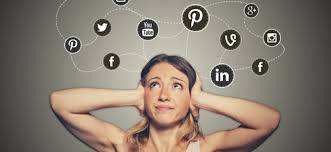_The Impact of Social Media on Mental Health: Separating Fact from Fiction_
Social media has become an integral part of our daily lives. Platforms like Facebook, Instagram, and Twitter have made it easier for us to connect with others, share our experiences, and stay informed about current events. However, there is growing concern about the impact of social media on our mental health.
In this article, we'll explore the relationship between social media and mental health, separating fact from fiction. We'll examine the potential risks and benefits of social media use, and discuss strategies for maintaining a healthy balance between our online and offline lives.
The Risks of Social Media Use
Numerous studies have suggested that excessive social media use can have negative effects on mental health. Some of the potential risks include:
1. _Increased symptoms of depression and anxiety_: Studies have shown that people who spend more time on social media are more likely to experience symptoms of depression and anxiety.
2. _Sleep disturbances_: Exposure to screens and the constant notifications from social media can interfere with sleep patterns, leading to fatigue, irritability, and other mental health problems.
3. _Unrealistic comparisons and decreased self-esteem_: Social media platforms showcase the highlight reels of other people's lives, making it easy to compare and feel inferior.
4. _Cyberbullying and online harassment_: Social media can be a breeding ground for bullying and harassment, which can have serious negative effects on mental health.
The Benefits of Social Media Use
While there are risks associated with social media use, there are also potential benefits. Some of these benefits include:
1. _Social support and connection_: Social media can provide a sense of connection and community, which is especially important for people who are isolated or have difficulty forming social connections in person.
2. _Access to information and resources_: Social media can be a valuable source of information and resources, especially for people who are looking for support or guidance on mental health issues.
3. _Self-expression and creativity_: Social media can provide an outlet for self-expression and creativity, which can be beneficial for mental health.
Maintaining a Healthy Balance
So, how can we maintain a healthy balance between our social media use and our mental health? Here are some strategies to consider:
1. _Set boundaries and limits_: Establish rules for your social media use, such as limiting your time on social media or avoiding social media before bed.
2. _Take breaks and practice self-care_: Regularly take breaks from social media and engage in activities that promote relaxation and stress reduction, such as exercise, meditation, or spending time in nature.
3. _Use social media intentionally_: Instead of mindlessly scrolling through social media, use social media with a specific purpose in mind, such as connecting with friends, seeking support, or accessing information and resources.
Conclusion
Social media is a complex and multifaceted phenomenon that can have both positive and negative effects on mental health. By being aware of the potential risks and benefits, and by taking steps to maintain a healthy balance between our social media use and our mental health, we can use social media in a way that supports our well-being.




No comments yet
Be the first to share your thoughts!